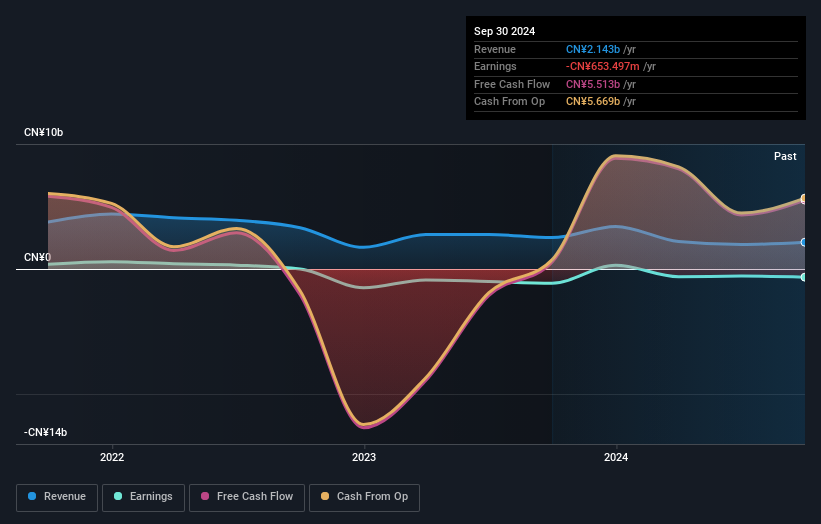- China
- /
- Capital Markets
- /
- SHSE:601162
Tianfeng Securities Co., Ltd. (SHSE:601162) stock most popular amongst individual investors who own 59%, while private companies hold 27%

Key Insights
- Significant control over Tianfeng Securities by individual investors implies that the general public has more power to influence management and governance-related decisions
- 40% of the business is held by the top 25 shareholders
- 12% of Tianfeng Securities is held by Institutions
A look at the shareholders of Tianfeng Securities Co., Ltd. (SHSE:601162) can tell us which group is most powerful. We can see that individual investors own the lion's share in the company with 59% ownership. That is, the group stands to benefit the most if the stock rises (or lose the most if there is a downturn).
Meanwhile, private companies make up 27% of the company’s shareholders.
In the chart below, we zoom in on the different ownership groups of Tianfeng Securities.
See our latest analysis for Tianfeng Securities

What Does The Institutional Ownership Tell Us About Tianfeng Securities?
Many institutions measure their performance against an index that approximates the local market. So they usually pay more attention to companies that are included in major indices.
Tianfeng Securities already has institutions on the share registry. Indeed, they own a respectable stake in the company. This suggests some credibility amongst professional investors. But we can't rely on that fact alone since institutions make bad investments sometimes, just like everyone does. When multiple institutions own a stock, there's always a risk that they are in a 'crowded trade'. When such a trade goes wrong, multiple parties may compete to sell stock fast. This risk is higher in a company without a history of growth. You can see Tianfeng Securities' historic earnings and revenue below, but keep in mind there's always more to the story.

Tianfeng Securities is not owned by hedge funds. Our data shows that Hubei Hongtai Group Co., Ltd is the largest shareholder with 15% of shares outstanding. Wuhan State-Owned Capital Investment and Operation Group Co., Ltd. is the second largest shareholder owning 8.9% of common stock, and Wuhan Financial Holding (Group) Co., Ltd., Asset Management Arm holds about 2.3% of the company stock.
A deeper look at our ownership data shows that the top 25 shareholders collectively hold less than half of the register, suggesting a large group of small holders where no single shareholder has a majority.
While studying institutional ownership for a company can add value to your research, it is also a good practice to research analyst recommendations to get a deeper understand of a stock's expected performance. We're not picking up on any analyst coverage of the stock at the moment, so the company is unlikely to be widely held.
Insider Ownership Of Tianfeng Securities
The definition of an insider can differ slightly between different countries, but members of the board of directors always count. Company management run the business, but the CEO will answer to the board, even if he or she is a member of it.
Insider ownership is positive when it signals leadership are thinking like the true owners of the company. However, high insider ownership can also give immense power to a small group within the company. This can be negative in some circumstances.
We note our data does not show any board members holding shares, personally. It is unusual not to have at least some personal holdings by board members, so our data might be flawed. A good next step would be to check how much the CEO is paid.
General Public Ownership
The general public -- including retail investors -- own 59% of Tianfeng Securities. With this amount of ownership, retail investors can collectively play a role in decisions that affect shareholder returns, such as dividend policies and the appointment of directors. They can also exercise the power to vote on acquisitions or mergers that may not improve profitability.
Private Company Ownership
We can see that Private Companies own 27%, of the shares on issue. It's hard to draw any conclusions from this fact alone, so its worth looking into who owns those private companies. Sometimes insiders or other related parties have an interest in shares in a public company through a separate private company.
Next Steps:
It's always worth thinking about the different groups who own shares in a company. But to understand Tianfeng Securities better, we need to consider many other factors. For example, we've discovered 2 warning signs for Tianfeng Securities (1 is a bit unpleasant!) that you should be aware of before investing here.
Of course, you might find a fantastic investment by looking elsewhere. So take a peek at this free list of interesting companies.
NB: Figures in this article are calculated using data from the last twelve months, which refer to the 12-month period ending on the last date of the month the financial statement is dated. This may not be consistent with full year annual report figures.
Valuation is complex, but we're here to simplify it.
Discover if Tianfeng Securities might be undervalued or overvalued with our detailed analysis, featuring fair value estimates, potential risks, dividends, insider trades, and its financial condition.
Access Free AnalysisHave feedback on this article? Concerned about the content? Get in touch with us directly. Alternatively, email editorial-team (at) simplywallst.com.
This article by Simply Wall St is general in nature. We provide commentary based on historical data and analyst forecasts only using an unbiased methodology and our articles are not intended to be financial advice. It does not constitute a recommendation to buy or sell any stock, and does not take account of your objectives, or your financial situation. We aim to bring you long-term focused analysis driven by fundamental data. Note that our analysis may not factor in the latest price-sensitive company announcements or qualitative material. Simply Wall St has no position in any stocks mentioned.
About SHSE:601162
Tianfeng Securities
Operates as a financial securities service provider primarily in China.
Mediocre balance sheet minimal.
Market Insights
Community Narratives



